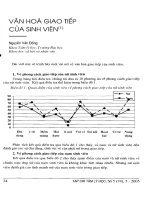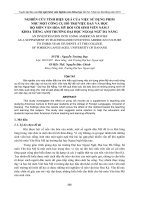Vietnamese studentss punctuality ( văn hóa đúng giờ của sinh viên)
Bạn đang xem bản rút gọn của tài liệu. Xem và tải ngay bản đầy đủ của tài liệu tại đây (152.32 KB, 11 trang )
1.
Introduction
Time is a so special resource that people cannot store or save it for the future. Everyone has the
same amount of limited time to 24 hours a day .However, only 20-30% of Vietnamese have
punctuality habit (Do 2010). It can be seen that wasting time in Vietnam has become a serious
problem. It is also one of the factors which contribute to negative impacts to proliferate and
integrate of the country.
An area in punctuality that is familiar topic relating to daily life but seldom looked into with
seriousness is that of university students. These academic years in university remark mature age
of students- a period full of changes and challenges. They are required to be more independent
for both life and study such as time management and financial management; therefore, the issue
is more and more complex because they are provision of balance for studying, working and
relaxing.
Not until the situation occurs in wide range of students did people concern about it but there have
been few formal investigations into students’s punctuality. Admittedly, numerous journalists
have tried to approach the subject through the articles, but each of them usually reflect only one
point of the punctuality, either current situations, causes or solutions. In “Unpunctual habit”,
Hong stated that unpunctuality is a specific characteristics of Vietnamese and a domino
influences (Hong 2013). In addition, Thuy in her article indicated that using “rubber time”
deprive many benefits which people should deserver such as the respect of others ( Thuy 2014).
To cope with that issue, a large methods are suggest by (Hong 2013) and (Do 2010).
Nevertheless, none of those articles are formal study and focus on punctuality among students at
university, just punctuality in general.
Bearing this in mind, this research paper which is based on data collected from students of FSD,
Hanoi University will answer three main questions. First of all, do FSD students are on time or
not and what are the causes? Secondly, what are the effects of punctuality and unpunctuality on
students? Last but not least, how can they do to be on time ?
2. Method
This research paper is based on primary source of data obtained by conducting questionnaires. In
the first place, 100 FSD Students at different majors were randomly selected to fill in the
1
questionnaires. All the questions were divided into 3 main groups. Firstly, 4 questions were
designed in order to assess the level of unpunctuality among students based on the frequency as
well as to find out its impacts on their academic life and their daily life. Secondly, a scaled
question was set up to determine the most popular causes of belated conditions. Lastly, the
questionnaires also include 4 questions to verify student’s willingness to combat this problem.
With the fundamental data from the questionnaires, the same questions were designed to confirm
our assumptions about the effect of unpunctuality in students. The main aim is to investigate
further into the reasons for unpunctuality along with some useful method for students to solve
this problem.
3. Results
The data included in this section was gathered by means of questionnaire to determine FSD
students’ punctuality. With a view to discover whether unpunctuality is a common situation
among students, a question about students’ frequency of unpunctuality for classes was given to
100 FSD students. Of all respondents, more than a third of them reported that they are late for
classes a few times a week. It is noticeable that quotidian unpunctuality accounts for 25% of all
students compare to punctuality (merely 3% ).
Figure 1: Students’ frequency of unpunctuality for classes
With regard to causes of postponement, the majority of students agreed that transport problems
prevent them from attending classes on time, at 71 agreements. Similarly, time management is
another main reason, consisting of nearly 60 consonances. However, time depreciation and
university atmosphere are two factors which do not have serious influences on unpunctuality.
Figure 2: The reasons for students’ lateness (unit: number of opinion)
As can be seen from Figure 3, nearly two-thirds of participants of this project is willing to tackle
unpunctuality by choosing the option “Strongly agree” while the number of students said “Not
sure” comprises 25%. Whereas, more than one in ten of them deems this problem not necessary
to solve.
2
There are some differences in students’ suggestion for tackling unpunctuality. Particularly, better
time management accounts for majority of all suggestions (62%). In addition, changing
accommodation and means of transport represent 21% and 15%, respectively.
4. Discussion
4.1. Current situation
On the whole, unpunctuality for classes is quite common circumstances to FSD students at Hanoi
University although they have consciousness of significance of punctuality. According to the
result of the punctuality quiz (Figure 1,p2 ), most students go to school late frequently which
demonstrates that tardiness at school is habit for majority of them no matter how massively
negative impacts they can get. However, whether students who are late for classes are likely to be
late for other events in daily life depends on the event and how important it is for the person.
Nguyen in her article indicated contradict situation that not only do students fall into lateness at
university but also in quotidian life such as hanging out with friends and taking part in clubs
(Nguyen 2013). Furthermore, for FSD students, if they are tardy, they will keep studying with
the teachers’ approval instead of skipping that lesson. They also believe unpunctuality is a
problem that needs addressing to make students more active and respected by others.
4.2. The causes for being late to students
The punctuality of students at FSD is affected by both internal and external factors. According to
the questionnaires, students point out that transport problem is main reason which makes them
late for school. It can be easily seen that students usually go to college at rush hour when
congestion happens, so they must confront with that problem which prevents them from being on
time. Another reason is lack of appropriate time management. Students, particularly students
living far away from home are known as billionaire of time because they spend most time for
3
surfing Internet, watching films late at night and hanging out with friends. As of lateness,
nocturnal streets, recreative clubs become more crowded, and the number of Facebook, Twitter
and other social networking sites accounts increase remarkably. Sleeping after 23 pm is common
habit for Vietnamese students and they are reputed as night owls (Cat 2013). That is the reason
why they meet difficulties to wake up and go to class on time. Significantly, a half of students
comes tardy because of unattractive lectures determining that subjects play important role in
attracting students and students pay more attention for lectures which they have great passion for.
Furthermore, teacher comes late and taking advantage of university atmosphere influence
student’ punctuality. If students go to school on time and they must wait for their teachers, it will
lead to depression. Besides, Hanoi university just have rule for time beginning class and does not
have strong method to unpunctual students to raise their awareness of punctuality for class.
4.3. The negative effects of being late among students
According to questionnaires, 80% of FSD students agree that unpunctuality has massively
negative impacts. First of all, it does harm to students’ academic life. Arriving to school after
classes beginning leads to missing more than just the introduction to a new lesson. While waiting
for the "tardy bell" to ring, teachers often share principal information, such as: handouts for the
coming tests, assignments’ deadlines and other school-related specifics. The late comers may
miss out on these details, as a consequence, be unprepared for some future events associating
with their subjects. Additionally, unpunctuality makes students less willing to study, ultimately
build up tension. It is proven by the fact that over 60% of the respondents acknowledged that they
keep studying even being tardy just because of an academic task. Besides, although, 70% of FSD
respondents believed that students being late for classes are not really likely to be late for other
daily life events, they do not have awareness of longer-term repercussions developed by this
issue. Professor MS. Rao (2009) wrote that if showing up late to school becomes a habit, students
may develop the belief that tardiness is an acceptable behavior. This one can negatively affect
their future work ethic and employment opportunities since these individuals might be reputed as
the undisciplined which will create more challenges for them to climb up the ladder of success at
the workplace along with other public occasions. Last but not least, unpunctuality does not affect
one subject but also the group. If the whole class is concentrating on a lesson when a student
comes late, apparently, he will disturb everyone’s focus, and finally influence the lessons’
quality.
4
5. Recommendations
As mentioned in the result section, more than 70% of answers directed that students are willing
to address unpunctuality and the most common solution they choose is having a better time
management. Because of this popular tendency, this part discusses how to have a good time
management and give some other useful suggestions so that FSD students can combat
unpunctuality most effectively. Regarding to time management or the way to make best use of
self-study time, firstly, students must complete all their academic entrusted tasks before classes.
It is said that all FSD students experience a dense curriculum with almost full-time study days,
thus to finish their tasks, they ought to make a to-do-list and on it, they schedule high-priority
activities. This ensures urgent activities and essential maintenance tasks cannot be delegated or
avoided. To make it most efficient, everyone should set timer when they should be finishing
activities like checking emails or Facebook surfing and keep to them to save time for other duties.
Additionally, it is necessary to use alarm clocks when students need to start getting dressed and
also when they must leave the house. By doing this, they will not only be less risky in
unpunctuality but also acquire more pleasure and readiness for the upcoming duties. Besides time
suggestions, students would consider to change their accommodation, for instance: living near
school, living in dormitory. Therefore, the less distance they travel, the more punctual they are.
Additionally, altering the present means of transport is also among most chosen options.
Especially, if student’s choice is public transportation, it will be also fruitful for both him and
community in terms of reducing traffic congestion, saving natural environment and fuel, etc.
Furthermore, there is one recommendation specified in questionnaire that is “finding some
motivations”. I highly indicate that a strongly effective motivation could gain from when students
remind themselves how tardiness has cost them to lose opportunities in the past, such as one
person made a bad impression at an interview or he annoyed others too much. These painful
reminders will spur students to do better. Moreover, university should give more strict rules to
boost students’ punctuality for example Thang Long University and FPT Ho Chi Minh University
installed scanners to supervise students’ promptness and teaching hours (Quynh 2012).
6. Conclusion
From all the findings above, it is clearly shown that the vast majority of FSD students is
unpunctual. Transport problems and lacking appropriate time management are the two most
popular reasons among the ones for this issue. As a consequence, the negative impacts of
5
unpunctuality are somehow reflected in student’s academic life, future chances related to career
and people surrounding. Hence, to orientate students to improve punctuality, recommendation
clarify some methods covering other fields (time, transportation, and accommodation,
motivation) to actively and effectively handle tardiness.
Owing to the breadth of this issue as opposed to the limited scale of this paper, we cannot cover
all details. What we try to convey in this research is to equip FSD students with vital knowledge
of the role of punctuality .Thus, they would highly evaluate the importance of being in time as
well as time. Hopefully, future researches can investigate further into this topic in order to
thoroughly examine all the causes and effects of unpunctuality as well as add more potential
ideas to elucidate it.
(2030 words)
Cat Thy 2013, ‘“Cú đêm”- thói quen phổ biến của sinh viên’,songtre. Available at URL
/>( Accessed 20 April)
Do Thong Minh 2010, ‘Tại Sao Người Việt Hay Đi Trễ? Phải Giải Quyết Ra Sao?’aihuubienhoa.
Available at URL />( Accessed 20 April)
Hong Dang 2013,’ Thói quen đi trễ’, tiengnoicuadan. Available at URL
/>( Accessed 20 April)
Nguyen Thi Phuong Trinh 2013, ‘"Giờ cao su" - Bệnh khó chữa của giới trẻ, songtre.
Available at URL
/>( Accessed 20 April)
Quynh Trang 2012, ‘Sinh viên đang đi học muộn như một thói quen’, TTVN.
Available at URL />6
( Accessed 20 April)
Rao.M.S 2009, ‘Where knowledge is wealth’, profmsr. Available at URL
/>( Accessed 27April)
Thuy Linh 2014, ‘“Giờ cao su”, dantri. Available at URL
/>( Accessed 20 April)
APPENDICES
APPENDIX A
QUESTIONARE
We are Vu Thi Kim Cuc and Hoang Thi Thuy Mai, ESP students, Foundation Studies
Department, Hanoi University. We are doing a research on Hanoi University Student’s
Punctuality. This questionnaire is designed to help us obtain data for our research project. We
highly appreciate your opinions which are apparently crucial to the completion as well as the
quality of our paper. Please return the completed questionnaire by 29 April 2016 .Thank you for
your cooperation. (please ( ) your options)
____________________________________________________________________________
1. How would you evaluate the importance of punctuality?
Very important
Not really important
Not important
2. How often do you attend your classes late?
Every day
7
A few times a week
A couple of times every few weeks
Rarely
Never
3. Do you believe that students who are late for classes are likely to be late for other
events in daily life?
Yes
It depends on the event and how important it is for the person
No
4. Do you think unpunctuality have massively negative impacts?
Yes
No
5. Reasons for unpunctuality of university students:
Reasons
Disagree
Not sure
Do not manage time properly
Unattractive lectures
Unattractive lectures
Transport problems (eg.
accidents, traffic jams,etc)
Do not value time
Take advantage of university
atmosphere (eg.more
independence, self-study
time,etc)
6. What would you do when you are late for class?
( If you tick ( ) the second choice, please go to Question 7)
I would skip that lesson
I would keep studying with the teachers’ approval
7. Why you decide to keep studying that lesson?
(You can choose more than one)
8
Agree
Like that lesson
Have an important task (e.g. presentation, mini test,etc)
Check attendance
Others(please specify).........................................................................................
8. Do you believe unpunctuality is a problem that needs addressing?
Absolutely yes
Yes, but I don’t think it really needs much attention
No
9. What would you do to improve your punctuality?
(You can choose more than one)
Have a better time management
Live near school
Live in dormitory ( kí túc xá)
Change the present means of transport
Others(please specify).............................................................................................
THANK YOU FOR YOUR COOPORATION!
APPENDIX B
QUESTIONNAIRE RESULTS
1. How would you evaluate the importance of punctuality?
Very important
Not really important
Not important
68%
31%
1%
2. How often do you attend your classes late?
Every day
A few times a week
A couple of times every few weeks
25%
34%
17%
Rarely
Never
21%
3%
3. Do you believe that students who are late for classes are likely to be late for other
events in daily life?
Yes
It depends on the event and how important it
is for the person
No
9
28%
69%
3%
Reasons
4.
Disagree
Not
Sure
23
18
22
18
33
35
11
20
71
25
29
48
25
32
39
Do not manage time properly
Unattractive lectures
Teacher comes late, too
Transport problems (eg. accidents, traffic
jams,etc)
Do not value time
Take advantage of university atmosphere
(eg.more independence, self-study time,etc)
Agree Do you
think
59
51
41
unpunctuality have massively negative impacts?
Yes
79%
No
21%
5. Reasons for unpunctuality of university students:
6. What would you do when you are late for class?
( If you tick ( ) the second choice, please go to Question 7)
I would skip that lesson
23%
I would keep studying with the teachers’ approval
77%
7. Why you decide to keep studying that lesson?
(You can choose more than one)
Like that lesson
33 options
Have an important task (e.g. presentation, mini test,etc)
63 options
Check attendance
62 options
Others(please specify):“Feeling guilty; My house is too far from school; Not waste time”
10
8. Do you believe unpunctuality is a problem that needs addressing?
Absolutely yes
72%
Yes, but I don’t think it really needs much attention
25%
No
3%
9. What would you do to improve your punctuality?
(You can choose more than one)
Have a better time management
84 options
Live near school
16 options
Live in dormitory ( kí túc xá)
13 options
Change the present means of transport
20 options
Others(please sepcify): “ Find some motivations”
11









